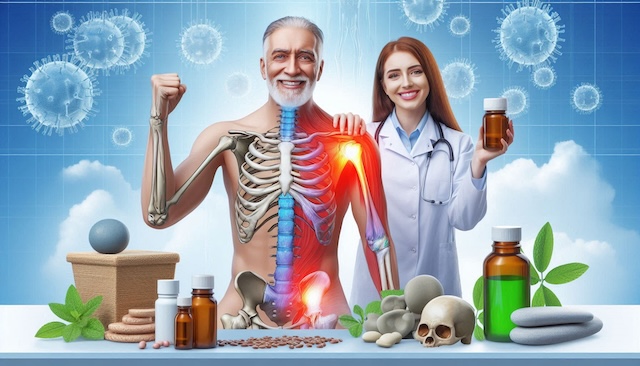Joint pain can be a significant disruptor in one’s daily life, affecting mobility, comfort, and overall quality of life. Whether caused by arthritis, injury, or other conditions, joint pain requires a multifaceted approach for effective management and relief. This article will provide an in-depth look at various strategies to alleviate joint pain, incorporating practical tips, lifestyle adjustments, and medical treatments.
Understanding Joint Pain
What Causes Joint Pain?
Joint pain, also known as arthralgia, can arise from various factors:
- Arthritis: Osteoarthritis and rheumatoid arthritis are common causes.
- Injury: Sprains, strains, and fractures can lead to pain.
- Infection: Bacterial or viral infections may affect joints.
- Chronic Conditions: Conditions like lupus or gout.
- Overuse: Repetitive movements can strain joints.
Symptoms of Joint Pain
Symptoms may include:
- Sharp or aching pain: Depending on the underlying cause.
- Stiffness: Especially noticeable in the morning or after inactivity.
- Swelling: Often a sign of inflammation or injury.
- Reduced Range of Motion: Difficulty in moving the affected joint.
Lifestyle Adjustments for Joint Pain Relief
Exercise and Physical Therapy
Importance of Exercise
Regular physical activity can strengthen the muscles around joints, improve flexibility, and reduce stiffness. Recommended exercises include:
- Low-Impact Aerobics: Swimming, cycling, and walking.
- Strength Training: Using light weights or resistance bands.
- Flexibility Exercises: Yoga and stretching routines.
Example Routine
A typical weekly exercise plan might include:
- Monday: 30-minute swim session.
- Wednesday: 20 minutes of strength training with resistance bands.
- Friday: 30 minutes of gentle yoga.
Weight Management
Maintaining a healthy weight reduces stress on weight-bearing joints such as the knees, hips, and back. Key strategies include:
- Balanced Diet: Focus on whole foods, lean proteins, and healthy fats.
- Portion Control: Avoid overeating and manage calorie intake.
- Regular Physical Activity: Integrate exercise to maintain a healthy weight.
Dietary and Nutritional Interventions
Anti-Inflammatory Foods
Certain foods can help reduce inflammation, which is often a source of joint pain:
- Omega-3 Fatty Acids: Found in fish like salmon, flaxseeds, and walnuts.
- Antioxidants: Berries, leafy greens, and tomatoes.
- Turmeric and Ginger: Known for their anti-inflammatory properties.
Sample Anti-Inflammatory Meal
- Breakfast: Smoothie with spinach, berries, and flaxseed.
- Lunch: Grilled salmon with a side of quinoa and steamed broccoli.
- Dinner: Chicken stir-fry with bell peppers and a ginger-turmeric sauce.
Supplements
Certain supplements may provide relief:
- Glucosamine and Chondroitin: Often used to support joint health.
- Vitamin D: Important for bone health.
- Curcumin: An active ingredient in turmeric, known for its anti-inflammatory effects.
Medical Treatments
Over-the-Counter Medications
Commonly used for managing joint pain:
- NSAIDs (Nonsteroidal Anti-Inflammatory Drugs): Ibuprofen, naproxen.
- Acetaminophen: Useful for pain relief but doesn’t address inflammation.
Prescription Medications
For more severe pain, a doctor may prescribe:
- Stronger NSAIDs: Such as COX-2 inhibitors.
- Disease-Modifying Antirheumatic Drugs (DMARDs): For rheumatoid arthritis.
- Biologics: Targeted treatments for specific types of arthritis.
Injections and Procedures
In some cases, injections or minor procedures may be recommended:
- Corticosteroid Injections: To reduce inflammation and pain.
- Hyaluronic Acid Injections: To lubricate the joint.
- Joint Aspiration: To remove excess fluid.
Physical Therapy
A physical therapist can provide tailored exercises and treatments to improve joint function and reduce pain. Techniques may include:
- Manual Therapy: Hands-on techniques to improve joint mobility.
- Modalities: Heat, cold, or ultrasound therapy.
Alternative Therapies
Acupuncture
Acupuncture involves inserting fine needles into specific points on the body. Research suggests it may help reduce pain and improve function.
Chiropractic Care
Chiropractors use spinal adjustments and other techniques to alleviate pain and improve joint function.
Massage Therapy
Massage can help relax tight muscles around joints, improving range of motion and reducing pain.
Preventive Measures
Ergonomic Adjustments
Making changes to your work and home environment can reduce strain on joints:
- Proper Posture: Maintain ergonomic sitting and standing positions.
- Supportive Furniture: Use chairs and desks that support joint health.
Injury Prevention
Taking steps to prevent injuries can help avoid joint pain:
- Warm-Up: Always warm up before exercising.
- Protective Gear: Use appropriate gear for sports and activities.
- Safe Techniques: Practice good techniques in physical activities.
When to Seek Medical Advice
While many strategies can help manage joint pain, some situations warrant professional consultation:
- Persistent or Severe Pain: If pain is ongoing or worsening.
- Joint Deformity: Noticeable changes in joint shape.
- Difficulty Moving: Severe restriction in joint movement.
Conclusion
Managing joint pain effectively involves a combination of lifestyle changes, dietary adjustments, medical treatments, and preventive measures. By adopting a holistic approach that includes regular exercise, a healthy diet, and appropriate medical care, individuals can significantly improve their quality of life and reduce the impact of joint pain. If you experience persistent or severe symptoms, it is essential to seek professional medical advice to tailor a treatment plan specific to your needs.
By addressing joint pain from multiple angles, you can enhance your overall well-being and regain control over your life.




Comments are closed.